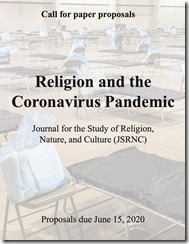Please find below the CFP for the Bloomsbury Handbook in Religion, Gender, and Sexuality. Due to the UK strikes and the current global health crisis, we have extended the deadline. I’d be grateful if you could pass around your networks and do get in touch if you have any questions!
Warmest wishes,
Dawn
CFP: Bloomsbury Handbook in Religion, Gender, and Sexuality
We are seeking papers for a new peer-reviewed edited volume, The Bloomsbury Handbook of Religion, Gender, and Sexuality. The aim is to generate a globally diverse, interdisciplinary and intersectional collection that captures emerging and contemporary themes and questions for the study of religions, genders, and sexualities.
We are looking for in-depth, scholarly essays, from a range of theoretical, methodological and disciplinary perspectives (conceptual and empirical). The Handbook aims to be a reference point for scholars and students searching for innovative engagements with critical issues relating to religion, gender, and sexuality.
We are seeking…
* to raise future-forming questions and provocations for religions, genders, and sexualities;
* to represent themes and issues emerging from broad geographical contexts;
* to explore religion and spirituality within and beyond institutional and historical settings;
* to promote the intersectional analyses of religion, gender, and sexuality with different identities and social locations such as race, nationalism, embodiment, class, economic status, and disability/ableness;
* to advocate that religion is significant for gender, feminist and women’s studies, and is a crucial social and political force in everyday life.
Suggested topics: This is, genuinely, an open call for papers, and indicative topics can include but are not limited to:
* politics and activism
* migration, diaspora, and transnational networks
* material cultures and products
* texts (literatures, scriptures, digital media, archives, documents, popular culture, arts, visual cultures, for example)
* well-being and healthcare
* the body and embodiment
* intimacies and relationships
* individual, communal, and social identities
* practices, beliefs, and experiences
* violence, oppressions and emancipations
* technologies
* spaces
Proposals
Proposals for chapters between 8,000 – 10,000 words (depending on the topic)
Please send proposals to all three editors:
- d.llewellyn@chester.ac.ukmailto:d.llewellyn@chester.ac.uk
- sh79@soas.ac.uk<mailto:sh79@soas.ac.uk>
- sonya.sharma@kingston.ac.uk<mailto:sonya.sharma@kingston.ac.uk>
Please including the following:
* name, affiliation (if relevant), and any other helpful information
* an abstract (max 200 words)
* a proposal (max 1000 words)
* anticipated word count for completed chapter
We welcome contributions from independent scholars, authors at all career stages and collaborative pieces. Please do feel free to contact the editors with any questions, at any stage.
Deadlines
Proposals Due: June 30th 2020
Acceptance Response: September 30th 2020
Contributors’ Chapters Due: April 30th 2021



